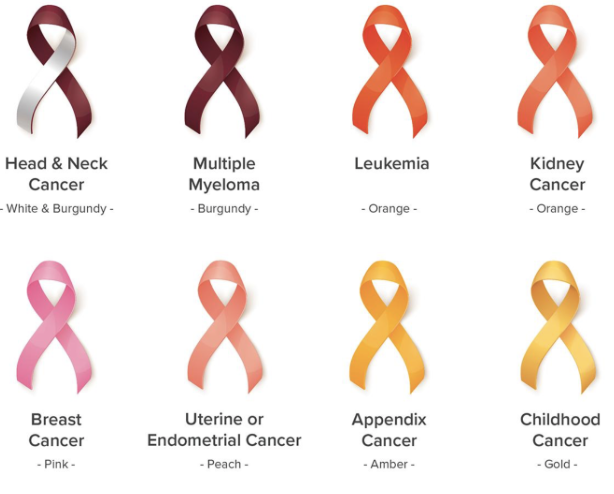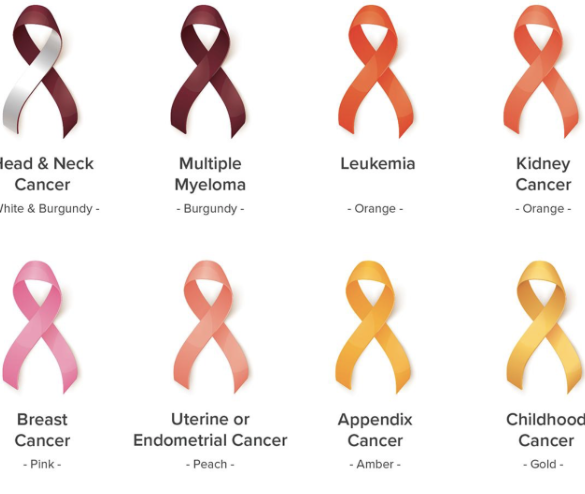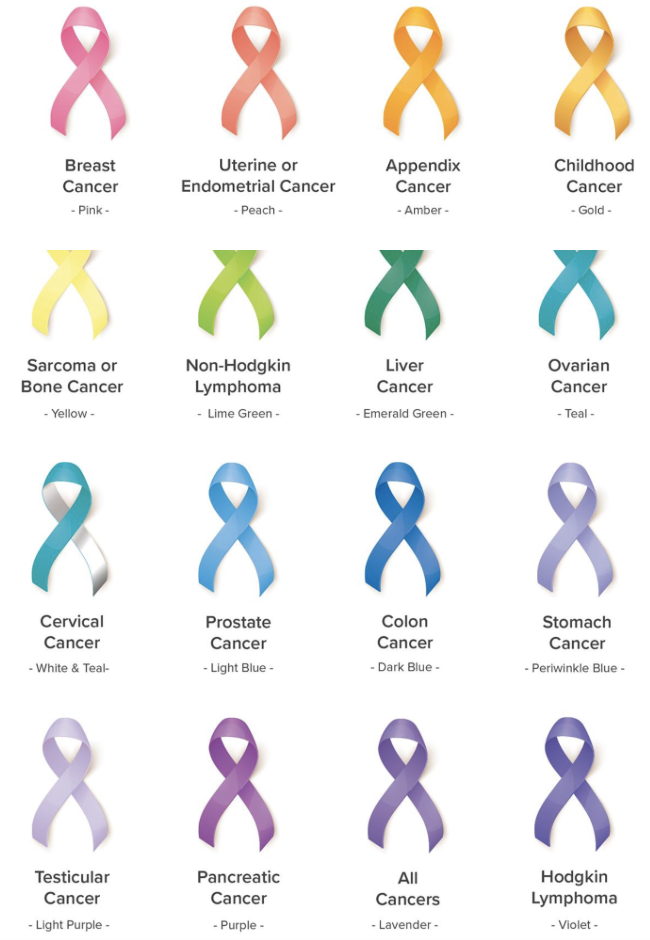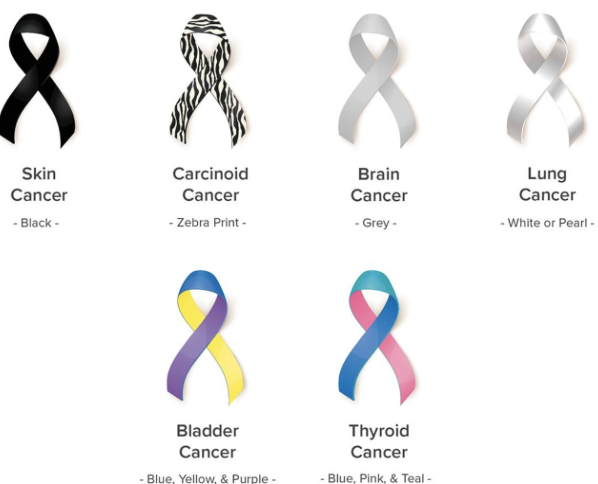Survivors have a special bond that endures even after treatment.
It is likely that you know at least one person who has had cancer. Cancer is among the leading causes of death worldwide, affecting over 1.5 million people each year. In 2020 alone, approximately 1.8 million people will be diagnosed with cancer in the United States.
Awareness ribbons represent each specific type of cancer. The idea of these ribbons is to spread awareness and to support people who have battled and continue to battle the disease.
Breast cancer, being the most common diagnosis, has a pink ribbon. However, most people are unaware of what type of cancer each ribbon represents. The chart below dictates the color ribbon and cancer type it represents.
Cancer diagnoses are increasing — 24% in men and 21% in women within the last decade. In 2019, roughly 16.9 million people in the United States survived cancer. These people, who are considered survivors from the time of their diagnosis through the rest of their life, rely heavily on the support from loved ones and other support groups. According to an article by Kenneth Portier, et al. these support groups help individuals to connect, normalize experiences, and reduce feelings of isolation.
Many cancer survivors continue to be a part of a support community after remission. A Muncie cancer support group, Survivor Voices Choir, is made up of individuals who have survived cancer and spend their time singing around east central Indiana at nursing homes, churches, women’s functions, special conferences, workshops, and luncheons for civic groups. They once even sang at an event commemorating veterans, according to Survivor Voices Choir Co-Director Molly Flodder.
Founded by oncologist Dr. Michael Williamson, Survivor Voices Choir strives to provide a group of people who are not only talented and inspire others, but a support group for cancer survivors, Flodder says.
The choir group averages 22 members, with men and women ages 52 to 83. Pre-COVID, the group practiced weekly on Tuesday evenings at Lutheran Church of the Cross on North Wheeling. Their meetings tended to be very informal practices filled with laughs, good conversations, support and, of course, lots of singing. They share “new or goods” with one another in which they talk about something new or something good that happened in their lives that week.
“You can always tell when a meeting or rehearsal is successful when people linger after to talk,” Flodder says. “And our people always do.”
“We recently lost a woman to blood cancer in March,” Flodder says. “She wasn’t in the group anymore because at the end she couldn’t practice anymore, but the way members reached out to each other and supported each other through the event of her death was inspiring.”
Not only has COVID put a stop to their practices, but also their performances. The group has not performed since February. Flodder says that singing is one of the worst things you can do in regard to spreading the virus because voices can propel virus-carrying particles up to 18 feet.
“We have a lot of people who are very high risk going through treatment right now,” Flodder says. “So, everyone is trying to stay away right now.”
Despite not being able to meet with one another, Survivor Voices Choir never stops encouraging and supporting each other.
“Members constantly ask each other how they are doing and how they are feeling,” Flodder says.
Support groups like Survivor Voices Choir strive to create communities for those who are battling or have battled cancer to share their experiences, inspire others, and form bonds that last forever.
Q&A Part
Cancer Survivors in Muncie Choir
Molly Flodder
Molly Flodder is the current co-Director of Survivor Voices Choir.
- Were you a part of any support groups or communities when you were diagnosed?
- “I got diagnosed with breast cancer 32 years ago and at that time I didn’t take any offers up for support groups. I was shocked and sad and didn’t want to talk about it. I didn’t want to be perky and funny, but now I would think again.”
- How does Survivor Voices support each other?
- “We are a faith friendly, but not a faith-based group. So if someone wants to stand up and say a prayer, no one hesitates and nobody cares or gets offended. We also have a lot of humor. Humor is a very supportive thing. Gail’s “My Chemo Song” sung to the tune of ‘Alleluia’ makes everybody laugh and we say things like ‘I have chemo brain today, I can’t think.”
Gail Green
Gail Green is a retired Ball State University professor and member of the Survivor Voices. However, she is currently battling breast cancer and had to take some time away from the choir.
- How does having a shared experience like cancer bond people together?
- “Support systems make life tolerable. We do things for each other because it makes the situation more tolerable and fun.”
- What is it like not being able to be a part of the choir right now?
- “It’s depressing being away, but we talk with each other through email and stay connected as much as we can.”
- What piece of advice do you have for how you stay so positive?
- “If you’re having a problem and you’re fighting through it, don’t forget to live every moment. Don’t forget there are other people in the world you could probably help. You’re not the only one in the world.”
- What has been the biggest impact of being a member of the Survivors Choir?
- “We enjoy each other, we know what each other is going through, and we try to keep each other’s spirits up. I just love it. It’s singing, which I enjoy, but we understand each other better than anyone else because of the situation. It’s therapeutic, and it helps me.”
- Why do cancer survivors need a support group/community?
- “Because we understand each other and we can discuss our problems and frustrations more freely. It’s everybody’s problem so it’s easier to talk about. Cancer is an ongoing thing, so it’s nice to be with people who understand that so we can talk about it.”
- How do you stay positive throughout your journey?
- “I want to enjoy every moment I have and I won’t do that if I am feeling sad or down. You can cry or you can laugh, and we choose laughter. It keeps us going. Also, doing something for somebody else makes it easier for me. During chemo, I wrote a verse to a song everytime to help me and to record what it was like for me. Every verse was what was happening to me that month. It’s to the song “Alleluia” and it allowed me to let loose of my frustrations. “My Chemo Song” is on YouTube and I got a lot of support through that. I wrote that song to state what I was going through, but also I wrote that song for everyone.”
https://www.youtube.com/watch?v=zjouUSSPbd0
Marilyn “Kay” Stickle
Marilyn is a retired Ball State professor who volunteers at the Ball Memorial Cancer Center. She describes her time volunteering at the cancer center as “Strictly fun where everyone laughs.”
- Were you a part of any support groups or communities when you were diagnosed?
- “When I was diagnosed 30 years ago, I didn’t know anyone who had recovered from cancer. I was not a part of any support groups because there weren’t any at that time. However, I would listen to speakers that came to the hospital because I believe the better you understand it, the better you’re able to cope with it.”
- How does having a shared experience like cancer bond people together?
- “Having a shared experience like cancer bonds people together because it allows them to see a future for themselves. At first, they feel very much alone. When they see somebody who is still alive, they feel uplifted because that person has recovered.”
- How have those bonds lingered on after the experience is over?
- “I am still in contact with a lady I met in chemo 30 years ago. We talk and send emails periodically and once or twice a year we meet up.”
- What has been the biggest impact of being a member of the Survivors Choir?
- “I have a good time there. I was in the group when it started. I enjoy when we go out and sing for groups so that they can see that there are survivors, and we still have energy to sing. I like being able to go out and help people see that there is an upside to cancer, not just a downside.”
- Why do cancer survivors need a support group/community?
- “Support groups are good for some people. Survivor Voices is good for everybody because it’s upbeat. Some groups are more melancholy. Cancer patients and survivors need people to treat them as normal as they can and do what they can to help them. Some support groups are just found within family, pinochle clubs, church, etc., but it still helps.”
- Do you wear a cancer ribbon?
- “I don’t wear my cancer ribbon very often, but I do wear it when it’s appropriate. Since I volunteer at the hospital NICU in the mornings, I can’t wear any kind of jewelry or pins. However, if I’m speaking to a group about cancer I wear it, it just depends on the situation.”
- Are there things non-survivors don’t understand that you wish they did?
- “When a person is diagnosed with cancer, they are hit from behind. They are stunned. They may have thought they just had back pain or a muscle spasm but no, it’s caused by some kind of cancer. They are stunned with their diagnosis, and even if they partially anticipated cancer, the big C-word still comes to mind.”
Cancer Survivors @ BSU
Tricia Esarey
- Why do cancer survivors need a support group/community?
- “Survivors need a community because there are tons of after effects from cancer and treatments that we deal with the rest of our lives, and it’s so nice knowing someone understands what you’re going through.
- It’s not a necessity to have a community, but it is nice to be around others that have been through similar things.
- Growing up, I had to constantly miss school to go to three or four different doctors for scans and check ups, and I never understood why none of my friends ever missed school and events like I did. I used to cry and be so mad that God had put me through this because it made me different and I couldn’t do all the things that other people my age could. It wasn’t until I got older that I truly understood that other people struggle like I did and still sometimes do.
- When I started getting involved in sports I struggled really hard with my breathing and I just assumed I was out of shape, but it got to a point where I knew I was in shape but I still couldn’t perform like my teammates. My primary care doctor came to the conclusion that I had asthma, but no inhalers ever worked. Finally, my cancer doctors looked more into it, and it was just the effects of my radiation being harder on my lungs and the chemo impacting my heart as I got older because I received treatment on my chest. So essentially no matter how ‘in shape’ I got, I would always struggle with cardio-centered activities because my lungs and heart couldn’t perform at optimal levels.”
- Are there things non-survivors don’t understand that you wish they did?
- “One thing that I still struggle with that others just don’t really fully understand is that although I don’t have cancer anymore, some of the drugs used to get rid of the cancer cause health issues that may show up out of the blue because of the long lasting impacts the harsh drugs have.”
- Do you wear a cancer ribbon?
- “I used to have my gold ribbon safety-pinned on my backpack, but it broke and fell off one day. But actually my first tattoo is my gold ribbon on my shoulder with ‘survivor’ written with it on my shoulder. So I always have my ribbon with me.”
Lane Leonard
- Why do cancer survivors need a support group/community?
- Survivors need a community because of how much you go through during treatments. Cancer makes everything more difficult both mentally and physically. Tasks, even as simple as walking, become difficult. When you are finally done with treatments and in remission, it is always better to have people who understand what you have been through. It makes you feel special.
- Are there things that non-survivors just don’t understand?
- It’s hard for people to look at a cancer patient and understand how bad the treatments can make you feel. They really can beat you down and make you feel terrible. There is always compassion, but there are some things that people just don’t understand. It’s a situation where only first-hand experience can fully enlighten you.
- Was there ever a time in your life when you felt no one could understand what you’re going through/went through?
- I was really young when I underwent treatment so I really wasn’t able to fully grasp my situation or what others felt. I do know that it was some of the toughest years my family has been through. For me, I didn’t know any different, but for my parents, it was a nightmare. I just know that nobody is ever alone. No matter what, there are other people who have had the same experiences, and there are doctors who work in situations like these all the time. Nobody ever faces cancer alone.
- Do you have/wear a cancer ribbon?
- Yeah, in a way I wear one everyday. When I was 17, I got my parents to sign off for me to get my first tattoo. On my left side, I have the Leukemia cancer ribbon and my favorite Bible verse. I thought it was a cool way to never forget my past.
Different Types of Cancer Ribbons:
- Lung Cancer: White
- Breast Cancer: Pink
- Stomach Cancer:
- Childhood Cancer: Gold






